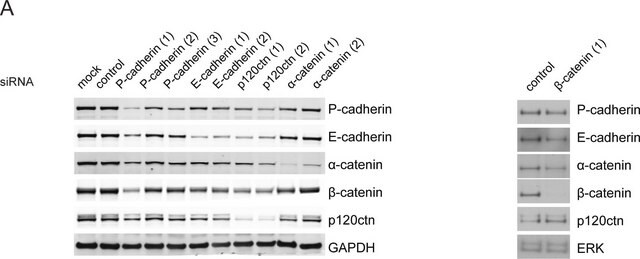Recommended Products
biological source
mouse
Quality Level
100
500
conjugate
unconjugated
antibody form
culture supernatant
antibody product type
primary antibodies
clone
14, monoclonal
description
For In Vitro Diagnostic Use in Select Regions (See Chart)
form
buffered aqueous solution
species reactivity
human
packaging
vial of 0.1 mL concentrate (224M-14)
vial of 0.5 mL concentrate (224M-15)
bottle of 1.0 mL predilute (224M-17)
vial of 1.0 mL concentrate (224M-16)
bottle of 7.0 mL predilute (224M-18)
manufacturer/tradename
Cell Marque™
concentration
1.0-5.0 μg/mL (predilute)
25-125 μg/mL (concentrate)
technique(s)
immunohistochemistry (formalin-fixed, paraffin-embedded sections): 1:25-1:100
isotype
IgG1
control
fibromatosis of breast
shipped in
wet ice
storage temp.
2-8°C
visualization
membranous, nuclear
Related Categories
General description
Quality
 IVD |  IVD |  IVD |  RUO |
Linkage
Physical form
Preparation Note
Other Notes
Legal Information
Not finding the right product?
Try our Product Selector Tool.
Certificates of Analysis (COA)
Search for Certificates of Analysis (COA) by entering the products Lot/Batch Number. Lot and Batch Numbers can be found on a product’s label following the words ‘Lot’ or ‘Batch’.
Already Own This Product?
Find documentation for the products that you have recently purchased in the Document Library.
Articles
Colorectal cancer is the third most common cancer in both men and women. An estimated 136,000 cases of colorectal cancer are expected to occur in 2016.
Related Content
Trusted IVDR-ready supplier of high-quality Cell Marque™ antibodies for diagnostic pathology and IHC, ensuring reliability and expert support.
Trusted IVDR-ready supplier of high-quality Cell Marque™ antibodies for diagnostic pathology and IHC, ensuring reliability and expert support.
Trusted IVDR-ready supplier of high-quality Cell Marque™ antibodies for diagnostic pathology and IHC, ensuring reliability and expert support.
Trusted IVDR-ready supplier of high-quality Cell Marque™ antibodies for diagnostic pathology and IHC, ensuring reliability and expert support.
Our team of scientists has experience in all areas of research including Life Science, Material Science, Chemical Synthesis, Chromatography, Analytical and many others.
Contact Technical Service








